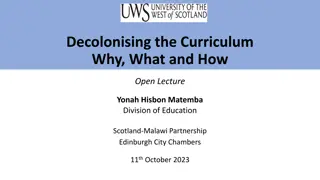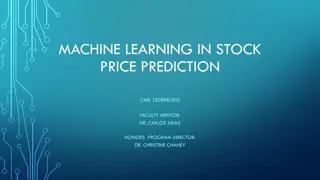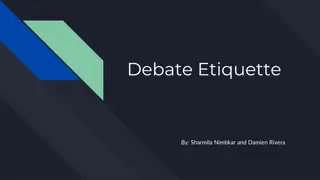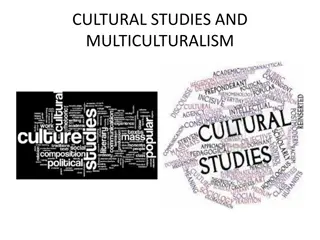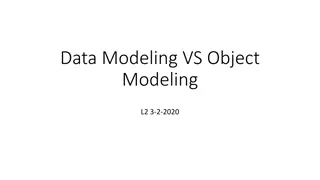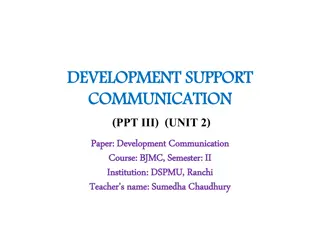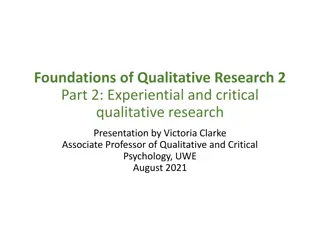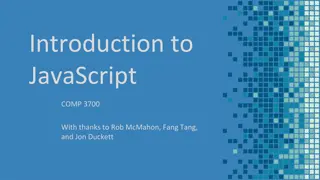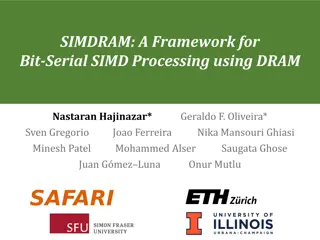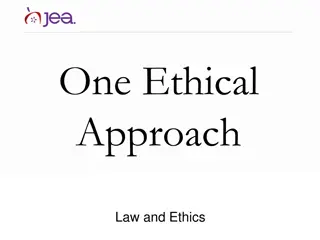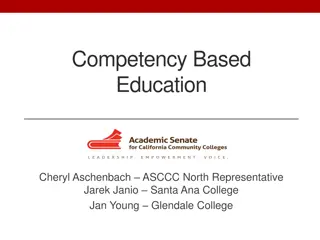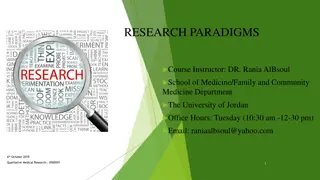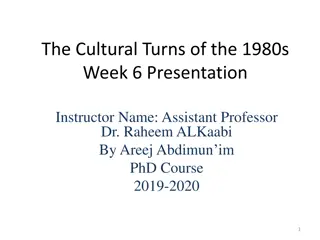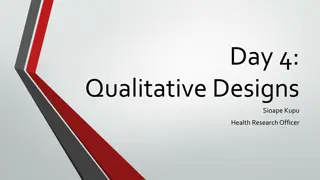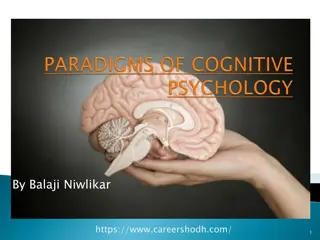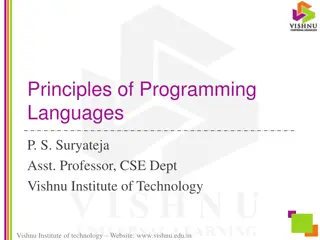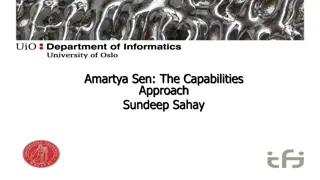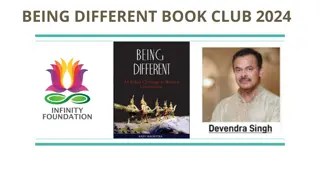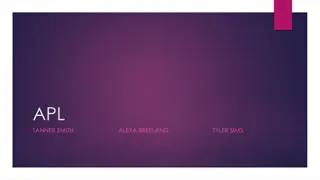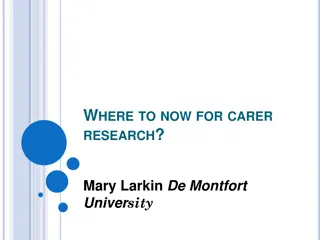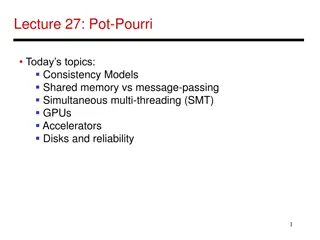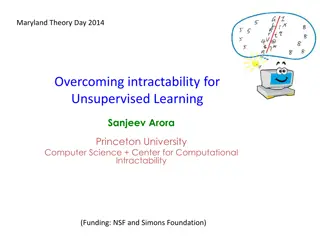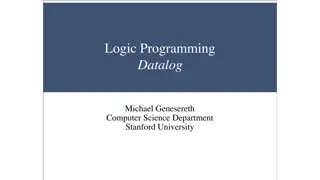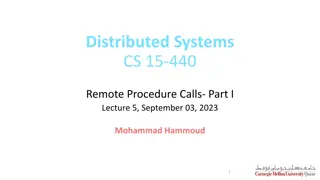Enhancing Academic Freedom in Curriculum
Explore academic freedom's role in creating inclusive learning environments by challenging traditional paradigms. Join discussions on curriculum's relationship to academic freedom and fostering student belonging in higher education spaces.
1 views • 41 slides
Entrepreneurship Master Class at the University of Bejaia: Concepts and Processes
This Entrepreneurship Master Class at the University of Bejaia, part of the Ci-RES project (Erasmus+), focuses on developing students' initiative and entrepreneurial spirit. Topics include entrepreneurial paradigms, characteristics of entrepreneurs, the entrepreneurial process, financing, and legal
2 views • 35 slides
Decolonising the Curriculum Why, What and How
Explore the complexities of decolonising the curriculum in Scottish education, addressing epistemic privilege, Black History Month, Scottish history and colonialism, missionary movements, and the nuances of the curriculum itself. Consider the purpose and impact of decolonisation efforts in reshaping
1 views • 24 slides
Insights into Theoretical English Grammar
The theoretical English grammar delves into the subject matter of grammar, including systemic conceptions, grammatical forms, categories, paradigms, and morphological means. It discusses the constituent parts of language – phonology, lexicology, and grammar. The grammatical structure covers morpho
7 views • 26 slides
Overview of Distributed Systems: Characteristics, Classification, Computation, Communication, and Fault Models
Characterizing Distributed Systems: Multiple autonomous computers with CPUs, memory, storage, and I/O paths, interconnected geographically, shared state, global invariants. Classifying Distributed Systems: Based on synchrony, communication medium, fault models like crash and Byzantine failures. Comp
9 views • 126 slides
MedKarma,Pioneering Paradigms in Hospital Billing Services for Seamless Healthcare Experiences
In the dynamic landscape of healthcare, the intersection of quality care and efficient billing services is crucial for ensuring seamless experiences for patients. One company that stands at the forefront of this intersection is MedKarma. Through its innovative approach to hospital billing services,
8 views • 8 slides
Evolution of Development Communication: Theoretical Frameworks and Applications
Exploring the interdisciplinary field of Development Communication, this seminar delves into theoretical frameworks, methodological applications, and practical implications at the World Bank. It reflects on the evolution, theories, and practices underlying Development Communication paradigms, with a
4 views • 57 slides
Material Handling Excavators Market Analysis, Size, Share, Growth, Trends Foreca
The Global Material Handling Excavators market shapes the construction and infrastructure development sectors. Material handling excavators, robust and versatile, play a pivotal role in the efficient movement of heavy loads, reshaping the operational paradigms in various industries.
0 views • 9 slides
Understanding Machine Learning for Stock Price Prediction
Explore the world of machine learning in stock price prediction, covering algorithms, neural networks, LSTM techniques, decision trees, ensemble learning, gradient boosting, and insightful results. Discover how machine learning minimizes cost functions and supports various learning paradigms for cla
2 views • 8 slides
Mastering Debate Etiquette: A Comprehensive Guide
Enhance your debate skills with this comprehensive guide on debate etiquette. Learn about pre-debate introductions, flipping the coin, understanding judge paradigms, and in-round etiquette. Discover essential tips for interacting with opponents, making strategic decisions, and maintaining respect th
0 views • 8 slides
Exploring Cultural Studies and Multiculturalism
Cultural studies is an interdisciplinary field that examines cultural differences while aiming to create a shared culture where diversity is respected. It challenges traditional views by studying all cultural productions and their societal contexts. Stuart Hall's work further delves into different p
0 views • 18 slides
Understanding Data Modeling vs Object Modeling
Data modeling involves exploring data-oriented structures, identifying entity types, and assigning attributes similar to class modeling in object-oriented development. Object models should not be solely based on existing data schemas due to impedance mismatches between object and relational paradigm
0 views • 17 slides
Understanding Asset Shares and Estate Management in Insurance: Insights from the 35th India Fellowship Webinar
Delve into the complexities of asset shares and estate management in the insurance industry through the lens of the insightful 35th India Fellowship Webinar. Learn about historical paradigms, regulatory shifts, and available alternatives for insurers in managing asset shares and estate growth. Explo
3 views • 30 slides
Evolution of Development Communication Paradigms and Alternative Paradigm
Development Communication explores the stages of creating a plan, implementing strategies, and ownership paradigms in development projects. Emphasis is on participatory approaches, community empowerment, and inverting top-down processes. The concept of Alternative Paradigm emerges to counter the ali
0 views • 6 slides
Understanding Experiential vs. Critical Qualitative Research
Delve into the foundations of qualitative research with a focus on experiential and critical approaches. Explore key concepts, defining characteristics, and theoretical foundations, distinguishing between qualitative and quantitative research. Reflect on different orientations, subjectivity, and ref
0 views • 16 slides
Introduction to JavaScript: History, Features, and Functional Paradigm
JavaScript, initially developed by Netscape Communications in 1995, has evolved into a versatile language with support for functional programming paradigms. From its history with Netscape Navigator to its support for prototypal inheritance and functional features like higher-order functions and API
2 views • 18 slides
SIMDRAM: An End-to-End Framework for Bit-Serial SIMD Processing Using DRAM
SIMDRAM introduces a novel framework for efficient computation in DRAM, aiming to overcome data movement bottlenecks. It emphasizes Processing-in-Memory (PIM) and Processing-using-Memory (PuM) paradigms to enhance processing capabilities within DRAM while minimizing architectural changes. The motiva
2 views • 14 slides
Introduction to ABA, Ethics, & Core Principles: A Paradigm Overview
This chapter provides a historical context of approaches to ethical behavior in behavior analysis. It discusses theoretical conflicts, the importance of consequences, and reviews dominant paradigms in clinical ethics such as virtue ethics, consequentialism, and deontology. It explores the concept of
0 views • 38 slides
Red Light vs. Green Light Ethics in Journalism: A Critical Analysis
Exploring the ethical nuances between Red Light and Green Light approaches in journalism ethics through real-life situations and expert insights. The debate between caution and courage, restrictions and freedoms, and the impact on journalistic practices and societal perceptions are examined in depth
0 views • 13 slides
Understanding Competency-Based Education in Practice
Competency-Based Education (CBE) allows students to progress based on mastery of skills rather than seat time. It offers personalized learning, efficient outcomes, and focuses on employer needs. Examples include CTE courses, noncredit pathways, and open entry/exit programs. The approach emphasizes c
1 views • 12 slides
Understanding Research Paradigms in Qualitative Medical Research
Delve into the world of research paradigms in qualitative medical research with a focus on the key differences between objective and subjective research, the meaning of research paradigms, components of research paradigms, types of research paradigms, and how paradigms guide the selection of researc
0 views • 42 slides
The Cultural Turns of the 1980s in Translation Studies
This presentation explores the various cultural turns in Translation Studies during the 1980s, highlighting key scholars such as Snell-Hornby and Even-Zohar. It discusses the linguistic turn, pragmatic turn, and the significance of cultural studies in understanding translation processes, particularl
0 views • 30 slides
Qualitative vs. Quantitative Approaches in Health Research
Exploring the different methodologies, paradigms, and methods used in health research, this content highlights the distinction between qualitative and quantitative designs. It covers research questions, aims, objectives, hypotheses, and various quantitative approaches such as experimental and observ
1 views • 28 slides
Exploring Paradigms of Cognitive Psychology
Cognitive psychology, a branch of psychology, delves into mental processes like thinking, perceiving, remembering, and learning. This field views individuals as information processors, with paradigms guiding research methodologies. Key approaches include Information Processing, Connectionist, Evolut
0 views • 18 slides
Understanding Cloud Computing, Edge Computing, and Their Applications
Cloud computing entails centralized processing of data on powerful servers, offering scalable resources over the internet. Edge computing brings processing closer to data generation points, reducing latency and enhancing security. Both paradigms cater to different needs such as IoT, autonomous vehic
0 views • 18 slides
Understanding Formal Semantics of Programming Languages: From Lambda Calculus to Separation Logic
Explore the foundational concepts of formal semantics in programming languages, covering Lambda Calculus, Untyped and Simply-typed languages, Imperative languages, Operational and Hoare logics, as well as Separation logic. Delve into syntax, reduction rules, typing rules, and operational semantics i
7 views • 14 slides
Principles of Programming Languages at Vishnu Institute of Technology
Introduction to Principles of Programming Languages course including prerequisites, objectives, outcomes, and syllabus at Vishnu Institute of Technology. The course covers key concepts, popular programming paradigms and languages, practical knowledge in lexical analysis and parsing, as well as writi
0 views • 43 slides
The Capabilities Approach by Amartya Sen: Understanding Development and Freedoms
Amartya Sen's Capabilities Approach focuses on expanding people's real freedoms and choices to enhance development. It prompts debates on inequality measurement, role of institutions, and more. Sen identifies five types of freedoms essential for development, emphasizing the intrinsic and instrumenta
0 views • 28 slides
Exploration of Haitian Culture and Aging: Understanding Unique Perspectives
This research analysis delves into the cultural practices of Haitians, shedding light on how these practices shape their views on age and the aging process. From historical influences to values, rituals, dietary considerations, and medical care implications, this study aims to uncover the unique par
3 views • 10 slides
Contrasting Dharmic and Western Traditions: A Deep Dive into Cultural Differences
The Being Different Book Club 2024 explores the fundamental disparities between Dharmic and Western traditions. It challenges the notion of Western paradigms as universal and delves into the unique approaches of Dharmic traditions. Through a series of images and descriptions, the club highlights key
0 views • 12 slides
APL - A Functional Language with Array Paradigms
APL, named after the book "A Programming Language Paradigms," is a functional language with a focus on array manipulation. Developed in the 1960s by Kenneth E. Iverson, it has had a significant impact on the development of spreadsheets and computer math packages. APL operates with chains of monadic
0 views • 11 slides
Innovations in Social Work Research: Emerging Topics and Paradigms
Explore the latest trends in social work research at the 2016 Joint World Conference on Social Work, Education, and Social Development. Discover topics such as global change, indigenous concerns, and migration issues. Delve into research paradigms, methodologies, and challenges, including the impact
0 views • 8 slides
Implementing Strategic Areas for Non-Communicable Disease Prevention
Implementation of national prevention and control programs for non-communicable diseases is crucial for sustainable healthcare systems. Collaborating with multidisciplinary groups and shifting advocacy paradigms towards human rights and social determinants of health are essential. A transformation i
1 views • 20 slides
Exploring Carer Research Trends in the UK: A Critical Analysis
Research conducted at De Montfort University explores the evolution of carer research paradigms in the UK since 1995, aiming to critique the relationship between research/theory and our understanding of carers. Through multi-stage reviews and analysis, the study delves into key dimensions of carer r
0 views • 26 slides
Understanding Memory Consistency Models and Communication Paradigms in Computer Systems
Memory consistency models define the ordering of writes and reads in computer systems. Coherence ensures write propagation and serialization, while consistency models guide programmers in writing correct programs. Shared-memory and message-passing are two communication paradigms with different appro
0 views • 31 slides
Top Ten All-Time Stupid Quotes
Explore a collection of historical quotes demonstrating misguided predictions and beliefs, from dismissing the need for computers to doubting the significance of inventions like the telephone and moon landing. Reflect on the impact of self-paradigms and paradigms of others as discussed in the text,
0 views • 12 slides
Understanding Hebrew Verb Forms: Qal Qatal and Piel Qatal Paradigms
Explore the rules and nuances of using definite articles with prepositions, verb forms, and verb charts in Hebrew. Learn how to identify and read the Qal Qatal and Piel Qatal paradigms, and understand the significance of prepositions with the definite article. Dive into verb charts for Qatal and dec
0 views • 25 slides
Unsupervised Learning Paradigms and Challenges in Theory
Explore the realm of unsupervised learning as discussed in the Maryland Theory Day 2014 event. Overcoming intractability for unsupervised learning, the distinction between supervised and unsupervised learning, main paradigms, NP-hardness obstacles, and examples like the inverse moment problem are co
0 views • 38 slides
Unraveling the Complexities of Hex Game Encoding Paradigms
Hex, a strategic two-player game invented by John Nash and Piet Hein, poses intriguing challenges for mathematicians and computer scientists. This article delves into different paradigms for encoding Hex game rules, exploring the performance of each. From basic observations to advanced approaches li
0 views • 20 slides
Distributed Systems: Remote Procedure Calls and Communication Paradigms
Explore the fundamentals of distributed systems, focusing on remote procedure calls, communication paradigms, and middleware layers. Learn how entities communicate in distributed systems, classification of communication paradigms, and the role of middleware in facilitating communication between appl
0 views • 28 slides


